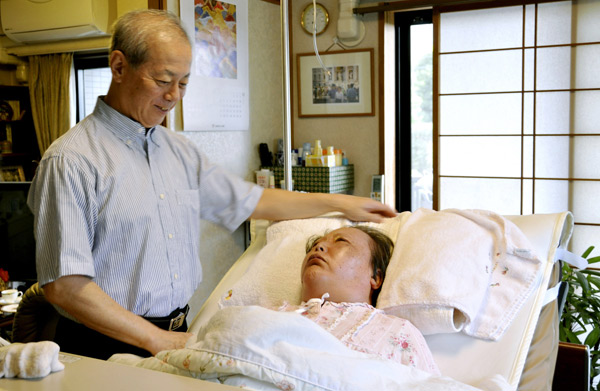 Alzheimer’s disease (AD), a severe form of dementia among aged individuals, is caused by accumulation of amyloid-beta (Aß) peptides in the brain. Numerous types of agents have been developed to suppress the production of Aß, by inhibiting the secretase-mediated cleavage of amyloid precursor protein (APP) into Aß peptides.
Alzheimer’s disease (AD), a severe form of dementia among aged individuals, is caused by accumulation of amyloid-beta (Aß) peptides in the brain. Numerous types of agents have been developed to suppress the production of Aß, by inhibiting the secretase-mediated cleavage of amyloid precursor protein (APP) into Aß peptides.
However, because the secretases also play important roles in the production of vital proteins for the human body, inhibitors of the secretases have increased risk for side effects.
Currently, Toyohashi Tech researchers in cooperation with a researcher at the National Academy of Sciences in Ukraine, proposed new agents for protecting the cleavage site of APP from attack by ?-secretase, based on results evaluated by their state-of-the-art molecular simulations.
They investigated the specific interactions between a short APP peptide and curcumin derivatives for the first time worldwide, using protein-ligand docking as well as ab initio molecular simulations. Curcumin is a constituent of turmeric, which is a popular yellow spice in Indian cuisine. The simulated results elucidated the specific curcumin derivative and showed that it bound more strongly to APP and inhibited the binding of secretase to APP more than the other derivatives did . Moreover, some novel curcumin derivatives were proposed as potent inhibitors of Aß peptide production. These derivatives are novel agents for suppressing AD and are proposed based on the novel concept of preventing APP cleavage. However, this does not imply that the consumption of Indian cuisine suppresses AD.
The first author, graduate student Hiromi Ishimura said, “We have also been studying the aggregation mechanism of Aß peptides by using molecular dynamics simulations (Okamoto et al. Journal of Molecular Graphics and Modeling, 50, 113-124, 2014; Yano et al. Chemical Physics Letters, 595-596, 242-249, 2014). By combining the present ab initio molecular simulation and the molecular dynamics simulations, we will be able to elucidate the mechanism and propose potent inhibitors for suppressing the aggregation of Aß peptides. These inhibitors are used as a therapeutic agent for ADs.”
Associate Professor Noriyuki Kurita said, “Our present molecular simulations elucidated that curcumin can bind APP and inhibit the cleavage of APP by secretase. Curcumin is a natural product contained in the root of Curcumae Rhizoma. In the laboratory of our collaborator at National Academy of Sciences in Ukraine, our proposed curcumin derivatives will be synthesized and theirs effects on experimental animals with ADs will be investigated.” The study done by Toyohashi University of Technology.